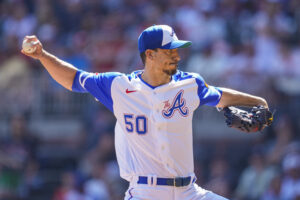The Braves announced today that veteran right-hander Charlie Morton had been placed on the 15-day injured list with right index finger inflammation. Fellow righty Allan Winans was called up in the corresponding move. The move not only ends Morton’s regular season, but also means that he will likely be unable to pitch in the NLDS as well, as he won’t be eligible to be activated until after rosters are set for the series. That said, if the Braves need to make an IL move midway through the series, it’s possible that they could activate Morton as a corresponding move when replacing the hypothetical injured player.
In any case, the loss of Morton is a major blow to a Braves team that has reigned as baseball’s best club throughout most of the 2023 campaign. Slated to be the club’s Game 3 starter this postseason behind the club’s dual aces Max Fried and Spencer Strider, the 39-year-old hurler has put together a vintage season for the Braves this year with a 3.64 ERA that’s 21% better than league average by measure of ERA+ and is backed up by a solid 3.88 FIP. Morton boasts a solid 25.6% strikeout rate and has generated groundballs at a solid 43.3% clip this season.
With Morton likely out for the NLDS, the club figures to turn to right-hander Bryce Elder to take the ball behind Fried and Strider. Elder was nothing short of incredible in the first half with a 2.97 ERA in his first eighteen starts, but the young righty has struggled badly in recent months with a 5.40 ERA and a nearly matching 5.37 FIP in his last 13 appearances. Another possibility would be right-hander Kyle Wright, who posted a 3.19 ERA en route to a MLB-leading 21-win campaign last year, but the 27-year-old hurler has battled injuries and ineffectiveness throughout the year, posting a brutal 7.71 ERA across just 25 1/3 innings of work. With limited time remaining for Wright to right the ship, it seems likely Atlanta will opt to utilize Elder to round out the playoff rotation until Morton is eligible to return.
In the meantime, replacing Morton on the roster is Winans, a 27-year-old rookie who sports a 4.50 ERA and 2.76 FIP across four spot starts this season. He’ll make another start this afternoon in game one of the club’s doubleheader against the Nationals opposite right-hander Jackson Rutledge.

